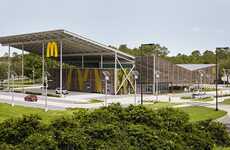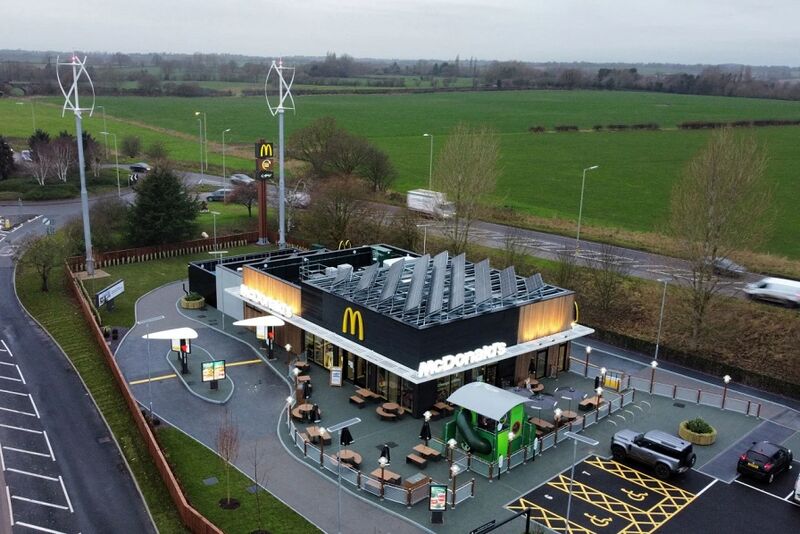
McDonald's Opened its First Net-Zero Restaurant in the UK
Elena Rahman — January 17, 2022 — Eco
References: aewarchitects & yankodesign
McDonald's opened its first net-zero restaurant in the UK. The fast-food chain industry is responsible for a portion of carbon emissions due to the nature of its processes. McDonald's is trying to offset its role in the planet's climate change by opening up a net-zero carbon location.
Fast-food chains must consider multiple factors to reduce carbon emissions, including the establishment's construction, operating, and demolition. The McDonald's Markey Drayton branch focused on using eco-friendly materials like wall insulation made from sheep's wool. Additionally, the parking lot kerbstones are made from 182 recycled plastic bottles, while the signage is made from McDonald's coffee beans to showcase the restaurant's "circular waste solution." With all its environmental efforts, the building is just short of being completely net-zero.
Image Credit: McDonald's / Anthony Devlin/PA
Fast-food chains must consider multiple factors to reduce carbon emissions, including the establishment's construction, operating, and demolition. The McDonald's Markey Drayton branch focused on using eco-friendly materials like wall insulation made from sheep's wool. Additionally, the parking lot kerbstones are made from 182 recycled plastic bottles, while the signage is made from McDonald's coffee beans to showcase the restaurant's "circular waste solution." With all its environmental efforts, the building is just short of being completely net-zero.
Image Credit: McDonald's / Anthony Devlin/PA
Trend Themes
1. Eco-friendly Fast-food - The trend of using more eco-friendly materials in fast food chains to reduce carbon emissions presents opportunities to innovate in sustainable construction materials and circular waste management strategies.
2. Net-zero Carbon Buildings - The trend of constructing net-zero carbon buildings presents opportunities to innovate in renewable energy sources and energy-efficient construction techniques.
3. Circular Economy - The trend of adopting circular economy practices in fast food chains presents opportunities to innovate in waste reduction and recycling processes.
Industry Implications
1. Fast-food Chains - Fast-food chains can innovate in sustainable construction materials, renewable energy sources, and waste reduction strategies to reduce their carbon footprint.
2. Construction Industry - The construction industry can innovate in sustainable construction materials and energy-efficient building techniques to meet the increasing demand for net-zero carbon buildings.
3. Waste Management Industry - The waste management industry can innovate in recycling processes and circular economy strategies to support fast food chains in achieving their sustainability goals.
6.1
Score
Popularity
Activity
Freshness























